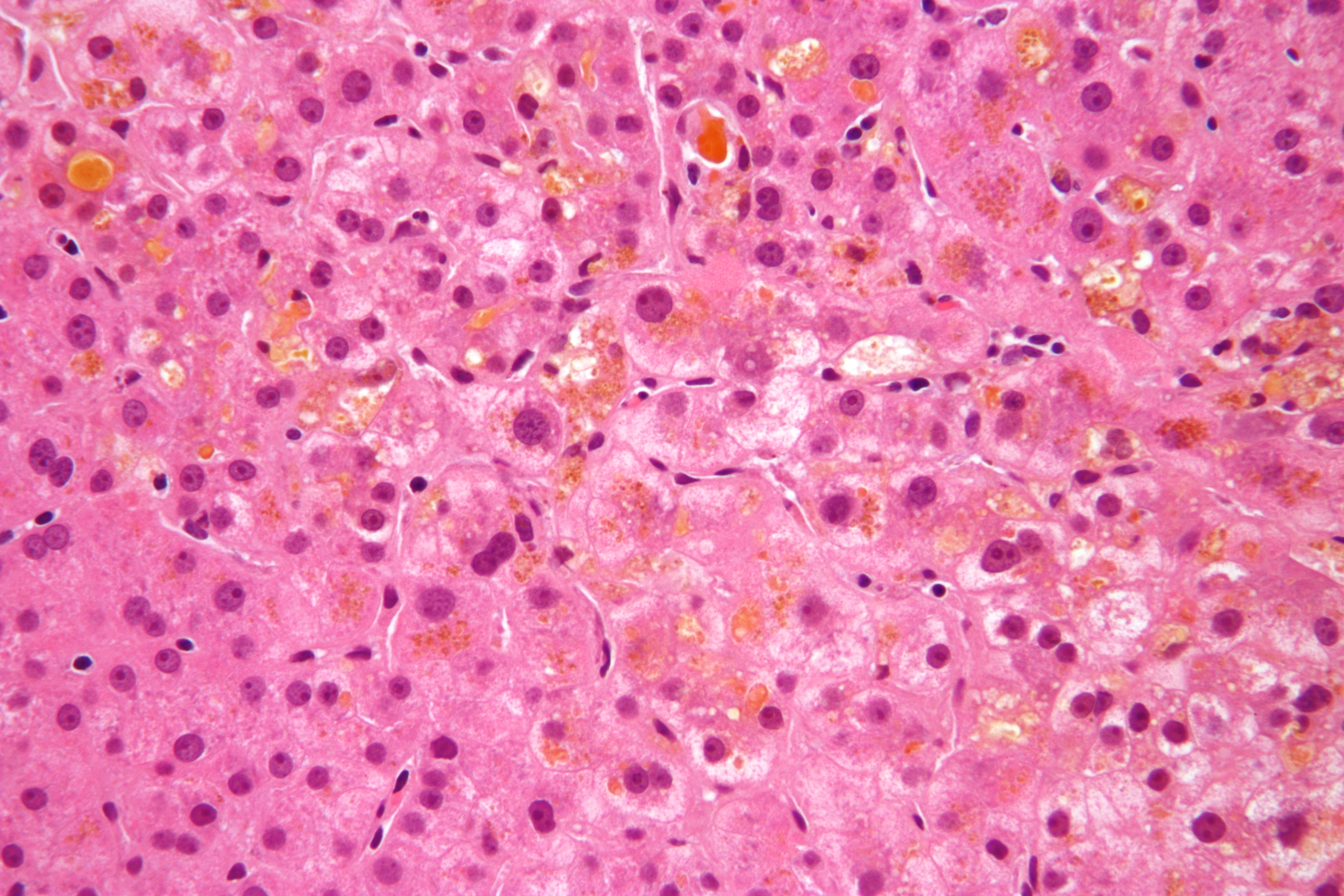Cholestasis
(Redirected from Cholestatic hepatitis)
Editor-In-Chief: Prab R Tumpati, MD
Obesity, Sleep & Internal medicine
Founder, WikiMD Wellnesspedia &
W8MD medical weight loss NYC and sleep center NYC
| Cholestasis | |
|---|---|

| |
| Synonyms | N/A |
| Pronounce | N/A |
| Specialty | N/A |
| Symptoms | Jaundice, pruritus, dark urine, pale stools |
| Complications | Cirrhosis, liver failure |
| Onset | Varies |
| Duration | Depends on cause |
| Types | N/A |
| Causes | Bile duct obstruction, liver disease, medications |
| Risks | Pregnancy, cystic fibrosis, primary sclerosing cholangitis |
| Diagnosis | Blood tests, imaging studies, liver biopsy |
| Differential diagnosis | Hepatitis, gallstones, pancreatitis |
| Prevention | N/A |
| Treatment | Depends on cause; may include ursodeoxycholic acid, surgery, liver transplant |
| Medication | Ursodeoxycholic acid, cholestyramine |
| Prognosis | N/A |
| Frequency | Common |
| Deaths | Varies depending on underlying cause |
Cholestasis is a medical condition characterized by the impairment of bile flow from the liver to the duodenum, which can lead to a buildup of bile acids in the liver and bloodstream. This condition can be caused by a variety of factors, including liver diseases, bile duct obstructions, and certain medications. Cholestasis can occur within the liver (intrahepatic) or outside the liver (extrahepatic).
Causes[edit | edit source]
Cholestasis can be caused by several factors, which can be broadly classified into intrahepatic and extrahepatic causes. Intrahepatic causes include conditions that affect the liver cells directly, such as hepatitis, alcoholic liver disease, and genetic disorders like Progressive familial intrahepatic cholestasis. Extrahepatic causes are related to obstructions in the bile ducts, such as gallstones, cholangiocarcinoma (bile duct cancer), and pancreatic cancer.
Symptoms[edit | edit source]
The symptoms of cholestasis can vary depending on the underlying cause and severity of the condition. Common symptoms include jaundice (yellowing of the skin and eyes), dark urine, pale stool, itching (pruritus), and abdominal pain. Long-term cholestasis can lead to complications such as vitamin deficiencies due to poor absorption of fat-soluble vitamins (A, D, E, K), osteoporosis, and malnutrition.
Diagnosis[edit | edit source]
The diagnosis of cholestasis involves a combination of clinical evaluation, laboratory tests, and imaging studies. Blood tests can reveal elevated levels of liver enzymes, bilirubin, and bile acids. Imaging studies such as ultrasound, CT scan, and MRI can help identify blockages in the bile ducts. In some cases, a liver biopsy may be necessary to determine the cause of intrahepatic cholestasis.
Treatment[edit | edit source]
Treatment of cholestasis aims to address the underlying cause of the condition. For extrahepatic cholestasis caused by bile duct obstructions, treatments may include surgical removal of the obstruction, endoscopic procedures to clear the bile ducts, or the placement of stents to keep the ducts open. In cases of intrahepatic cholestasis, treatment options may include medications to improve bile flow, such as ursodeoxycholic acid, and managing the symptoms, such as using antipruritics for itching. In severe cases, a liver transplant may be considered.
Prevention[edit | edit source]
Preventing cholestasis involves managing risk factors and underlying conditions that can lead to bile duct obstruction or liver damage. This includes maintaining a healthy lifestyle, avoiding excessive alcohol consumption, and managing cholesterol levels to prevent gallstone formation.
Search WikiMD
Ad.Tired of being Overweight? Try W8MD's physician weight loss program.
Semaglutide (Ozempic / Wegovy and Tirzepatide (Mounjaro / Zepbound) available.
Advertise on WikiMD
|
WikiMD's Wellness Encyclopedia |
| Let Food Be Thy Medicine Medicine Thy Food - Hippocrates |
Translate this page: - East Asian
中文,
日本,
한국어,
South Asian
हिन्दी,
தமிழ்,
తెలుగు,
Urdu,
ಕನ್ನಡ,
Southeast Asian
Indonesian,
Vietnamese,
Thai,
မြန်မာဘာသာ,
বাংলা
European
español,
Deutsch,
français,
Greek,
português do Brasil,
polski,
română,
русский,
Nederlands,
norsk,
svenska,
suomi,
Italian
Middle Eastern & African
عربى,
Turkish,
Persian,
Hebrew,
Afrikaans,
isiZulu,
Kiswahili,
Other
Bulgarian,
Hungarian,
Czech,
Swedish,
മലയാളം,
मराठी,
ਪੰਜਾਬੀ,
ગુજરાતી,
Portuguese,
Ukrainian
Medical Disclaimer: WikiMD is not a substitute for professional medical advice. The information on WikiMD is provided as an information resource only, may be incorrect, outdated or misleading, and is not to be used or relied on for any diagnostic or treatment purposes. Please consult your health care provider before making any healthcare decisions or for guidance about a specific medical condition. WikiMD expressly disclaims responsibility, and shall have no liability, for any damages, loss, injury, or liability whatsoever suffered as a result of your reliance on the information contained in this site. By visiting this site you agree to the foregoing terms and conditions, which may from time to time be changed or supplemented by WikiMD. If you do not agree to the foregoing terms and conditions, you should not enter or use this site. See full disclaimer.
Credits:Most images are courtesy of Wikimedia commons, and templates, categories Wikipedia, licensed under CC BY SA or similar.
Contributors: Prab R. Tumpati, MD




